Do you struggle with weak, dull, or slow-growing hair? Are you constantly searching for ways to improve the health and appearance of your locks? While using hair scissors to trim your hair regularly is an essential part of maintaining its shape and style, there may be an underlying factor that you’re overlooking – nutrient deficiencies.
Your hair, just like any other part of your body, requires various nutrients to grow and stay healthy. When you lack these essential vitamins and minerals, your hair can become weak, brittle, and prone to damage.
In this article, we will explore the connection between hair health and nutrient deficiencies, and how you can identify and address any issues you may be facing.
Understanding Hair Growth and Structure
Before diving into nutrient deficiencies, it’s important to understand the basics of hair growth and structure. Each follicle on your scalp contains a hair bulb and papilla that are responsible for hair production.
The hair bulb receives nourishment from the bloodstream, which supplies essential nutrients to support the growth of new hair cells.
The structure of each hair strand consists of multiple layers. The innermost layer, called the medulla, is followed by the cortex, which gives hair its strength, color, and texture.
Finally, the outermost layer, called the cuticle, acts as a protective barrier for the underlying layers.
The Role of Nutrients in Hair Health
Your hair relies on a variety of nutrients to grow and maintain its strength and shine. Here are some key vitamins and minerals that play a vital role in hair health:.
1. Biotin
Biotin, also known as vitamin H, is essential for hair growth. It helps produce keratin, a protein that makes up the structure of your hair strands. A deficiency in biotin can lead to hair thinning and even hair loss.
2. Iron
Iron is crucial for the production of hemoglobin, a protein in red blood cells that carries oxygen to various parts of the body, including the hair follicles.
Insufficient iron levels can cause hair follicles to receive inadequate oxygen, leading to weakened hair strands.
3. Zinc
Zinc plays a crucial role in hair tissue growth and repair. It helps keep the oil glands around hair follicles functioning properly, preventing hair from becoming dry and brittle. A deficiency in zinc can result in hair loss and slow hair growth.
4. Vitamin E
Vitamin E is a powerful antioxidant that helps protect hair follicles from oxidative stress. It aids in improving blood circulation in the scalp, ensuring that hair follicles receive adequate nutrients and oxygen for optimal growth.
5. Vitamin A
Vitamin A is responsible for producing sebum, a natural oil that moisturizes the scalp and keeps hair healthy. Without enough vitamin A, the scalp can become dry and itchy, hindering hair growth.
6. Vitamin D
Vitamin D is crucial for hair follicle cycling, a process that determines the growth and resting phases of hair. Insufficient vitamin D levels can disrupt this cycle and result in hair thinning or hair loss.
Identifying Nutrient Deficiencies
Nutrient deficiencies can manifest in various ways, and hair health often serves as an indicator of underlying issues. Here are some signs that may signal a nutrient deficiency:.
1. Hair Loss
Excessive hair shedding or noticeable hair thinning can be a sign of nutrient deficiencies. If you’re experiencing hair loss that isn’t related to genetics or age, it may be worth exploring potential nutrient imbalances.
2. Slow Hair Growth
If you find that your hair is growing at a slower rate than usual, it could be due to inadequate nutrient intake. Hair follicles need a steady supply of nutrients to produce new and healthy hair cells.
3. Brittle and Dry Hair
Brittle, dry, or easily damaged hair can indicate a lack of essential vitamins and minerals. Nutrients like biotin and zinc help keep your hair moisturized and resilient against environmental stressors.
4. Dull and Lackluster Hair
If your hair has lost its natural shine and appears dull or lackluster, it may be a result of nutrient deficiencies. Vitamins E and D, in particular, help maintain the vibrancy and luster of your hair.
Addressing Nutrient Deficiencies for Healthy Hair
If you suspect that nutrient deficiencies may be contributing to your hair problems, it’s essential to address them promptly. Here are some steps you can take to improve your nutrient intake and support healthy hair growth:.
1. Balanced Diet
Eating a well-balanced diet that includes a variety of fruits, vegetables, lean proteins, and whole grains is crucial for overall hair health. Ensure that your meals provide an adequate amount of essential vitamins and minerals.
2. Nutritional Supplements
In some cases, meeting your nutrient requirements through diet alone may be challenging. Nutritional supplements can help fill any gaps and ensure that your body has all the necessary building blocks for healthy hair growth.
3. Hair-Friendly Foods
Include hair-friendly foods in your diet, such as eggs, fatty fish rich in omega-3 fatty acids, spinach, nuts, seeds, and sweet potatoes. These foods contain a variety of nutrients vital for hair health.
4. Avoid Overstyling
Excessive heat styling, chemical treatments, and tight hairstyles can damage your hair and exacerbate existing deficiencies. Minimize the use of heated styling tools and opt for gentle hair care practices.
5. Regular Hair Trims
While addressing nutrient deficiencies is crucial for healthy hair growth, it’s equally important to maintain the overall condition of your hair. Regular trims with quality hair scissors help prevent split ends and promote a neat appearance.
The Bottom Line
Healthy hair requires a combination of proper care, well-balanced nutrition, and addressing any potential nutrient deficiencies.
By understanding the role of various vitamins and minerals in hair health, you can take proactive steps to support your locks and achieve the luscious mane you’ve always desired.






























